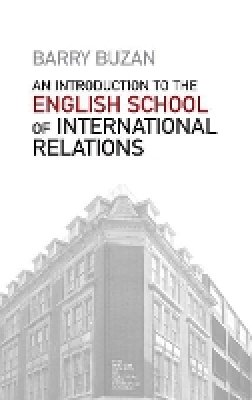
Stock image for illustration purposes only - book cover, edition or condition may vary.
An Introduction to the English School of International Relations: The Societal Approach
Barry Buzan
€ 88.07
FREE Delivery in Ireland
Description for An Introduction to the English School of International Relations: The Societal Approach
Hardback. This outstanding book is the first comprehensive introduction to the English School of International Relations. Written by leading ES scholar Barry Buzan, it expertly guides readers through the English School s formative ideas, intellectual and historical roots, current controversies and future avenues of development. Num Pages: 256 pages, black & white line drawings, figures. BIC Classification: JPA; JPS. Category: (P) Professional & Vocational. Dimension: 233 x 153 x 22. Weight in Grams: 492.
This outstanding book is the first comprehensive introduction to the English School of International Relations. Written by leading ES scholar Barry Buzan, it expertly guides readers through the English School’s formative ideas, intellectual and historical roots, current controversies and future avenues of development.
Part One sets out the English School’s origins and development, explaining its central concepts and methodological tools, and placing it within the broader canon of IR theory. Part Two offers a detailed account of the historical, regional and social structural strands of the English School, explaining the important link between the school’s historical projects and its interest in a societal approach to international relations. Part Three explores the School’s responses to the enduring problems of order and justice, and highlights the changing balance between pluralist and solidarist institutions in the evolution of international society over the past five centuries. The book concludes with a discussion of the English School’s ongoing controversies and debates, and identifies opportunities for further research.
For students new to the topic this book will provide an accessible and balanced overview, whilst those already familiar with the ES will be prompted to look afresh at their own understanding of its significance and potentiality.
Part One sets out the English School’s origins and development, explaining its central concepts and methodological tools, and placing it within the broader canon of IR theory. Part Two offers a detailed account of the historical, regional and social structural strands of the English School, explaining the important link between the school’s historical projects and its interest in a societal approach to international relations. Part Three explores the School’s responses to the enduring problems of order and justice, and highlights the changing balance between pluralist and solidarist institutions in the evolution of international society over the past five centuries. The book concludes with a discussion of the English School’s ongoing controversies and debates, and identifies opportunities for further research.
For students new to the topic this book will provide an accessible and balanced overview, whilst those already familiar with the ES will be prompted to look afresh at their own understanding of its significance and potentiality.
Product Details
Format
Hardback
Publication date
2014
Publisher
John Wiley and Sons Ltd United Kingdom
Number of pages
256
Condition
New
Number of Pages
256
Place of Publication
Oxford, United Kingdom
ISBN
9780745653143
SKU
V9780745653143
Shipping Time
Usually ships in 7 to 11 working days
Ref
99-50
About Barry Buzan
Barry Buzan is Emeritus Professor of International Relations at the LSE (formerly Montague Burton Professor), honorary professor at Copenhagen and Jilin Universities, and a Senior Fellow at LSE Ideas. In 1998 he was elected a fellow of the British Academy.
Reviews for An Introduction to the English School of International Relations: The Societal Approach
"Barry Buzan has led the rejuvenation of the English school since the turn of the century. This gem of a book is the culmination of his research leadership of this important theoretical domain of contemporary international relations. Readers will be pleased to find plenty of the analytical insight for which the author is renowned, supplemented by sharp commentaries on aspects of the historical, structural, and normative dimensions of the English school." Tim Dunne, University of Queensland "This book is the culmination of Buzan's call for a reconvening of the English School. Every conceivable aspect of the English School, what Buzan describes as a great conversation about international and world society, is included in this impressive book. Students and scholars alike will want to have this on their bookshelf." Brian C. Schmidt, Carleton University
